|
 Secure Site
Secure Site
|
 |
 solving problems in your sleep Text by Louisa Kamps
There’s a huddle of beefy thugs butchering a wolf at the base of a glassy tower that I must enter. The butchers turn from their prey, snarling, to chase me, but I manage to sneak in through a secret back door.
I race to the top floor, where an editor I respect hands back the tall cup I’ve been making smoothies in lately, pronouncing my most recent concoction bland and obvious.
I’m stung but can’t help noticing she’s managed to choke down the last drop.
Now, what to make of a dream like that? Part of me shies from supposing it has any deep meaning. Therapeutic dream analysis has become something of a punch line in this post-Freudian age. (So, doc, I was paddling around in a canoe when my father handed me a giant dagger….)
Then there’s the theory espoused by prominent neurologists since the late 1970s: Dreams are just physiological reactions to stimuli from the nervous system as our brains rest and digest the remains of the day.
Still, I can’t help thinking that this wacky night theater I’ve created must be doing something important.
There’s still so much we don’t know about dreams — like what causes them in the first place — but we may soon begin to unravel the mystery. Thanks to intensified efforts to understand what causes sleep disorders and determine how we can treat them, a growing body of research has recently converged to show that dreams not only help us consolidate new learning and think more creatively, but also recover more quickly from life’s emotional slings and arrows.
Anatomy of a Dreamscape
We typically spend more than 25 percent of our sleep time in a state conducive to dream weaving. As we drift off and enter stage 1, the light phase between sleep and waking, eye movement and muscle activity begin to slow.
 what do dreams mean? From there we move through stages 2 and 3, progressively deeper phases in which breathing and brain waves continue getting slower. About 90 minutes in, we’ll return to lighter sleep before suddenly moving into the phase known as rapid eye movement, in which most dreaming occurs.
We’ll cycle between REM and deeper sleep three to five times during the night, each time staying longer in dream-conducive REM.
During REM sleep, some of the physical and cognitive abilities that serve us so well in waking life fall away: Our muscles go slack to keep us from acting out on our dreams; parts of the brain’s prefrontal cortex responsible for decision-making become less active; the hippocampus, involved in recalling details of recent events, is less active too.
At the same time, the entire midsection of the brain — the region associated with emotion, including the amygdala, which assesses threats and triggers adrenaline — lights up. And in this alternate state of consciousness, during which we’re blind to the real world’s distractions yet flush with vivid imagery and strong feeling, our brains are sifting through new information, searching for ways to integrate it into what we already know and lay the important parts down permanently in memory.
Solving Problems in Your Sleep
In a series of studies looking at dreams’ impact on creative problem-solving, Sara Mednick, an assistant professor of psychiatry at the University of California, San Diego, has shown that naps including periods of REM (which we usually reach after about 50 minutes in an afternoon snooze) have significant cognitive benefits, repeatedly beating out caffeine as a secret weapon in mental performance tests.
In a paper she copublished last year, Mednick described giving subjects a creativity task in which they were asked to come up with a fourth word connected to three seemingly unrelated words. (For instance, “coin,” “quick,” and “spoon,” where “silver” is the missing link.)
Subjects took a test in the morning, then rested quietly before taking another test in the evening. Those who slept but didn’t fall into REM showed no improvement on their second test. But those who did get REM sleep scored 40 percent higher on the evening test than they had in the morning.
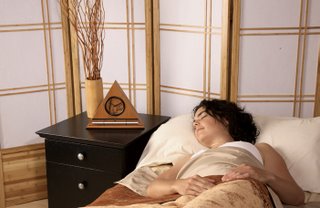 solving problems in your dreams To Mednick, this suggests that dreaming — when the becalmed hippocampus slows its efforts to relay rote, “explicit” information (which is consolidated in deeper, slow-wave sleep) — is the perfect workshop for making more abstract associations between facts and ideas already established in unconscious memory.
“REM allows us to take bits of information, de-emphasize the details of how the world works, ” she said.
Whole Living, November 2010
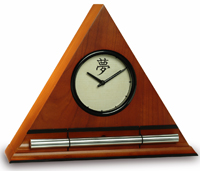 gentle wake up clock with chimes Now & Zen Chime Alarm Clock Headquarters
1638 Pearl Street
Boulder, CO 80302
(800) 779-6383
Posted in Chime Alarm Clocks
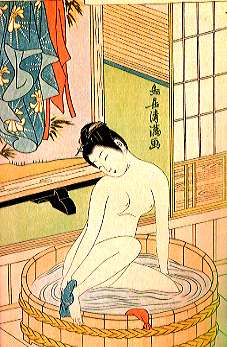 Choose a Gentle Wake Up in the Morning -- The Z E N Alarm Clock A Sleep in America Poll released by the National Sleep Foundation in 2008 reported that 65 percent of Americans have trouble falling asleep, wake during the night or wake feeling unrefreshed at least a few times each week. (On average, individuals need at least eight hours of sleep, but a recent finding that genetic makeup may play a role in how much sleep each person needs was published by UCSF researchers last week.)
Boulder, Colorado—an innovative company has taken one of life’s most unpleasant experiences (being startled awake by your alarm clock early Monday morning), and transformed it into something to actually look forward to. “The Zen Alarm Clock,” uses soothing acoustic chimes that awaken users gently and gradually, making waking up a real pleasure.
Rather than an artificial recorded sound played through a speaker, the Zen Clock features an alloy chime bar similar to a wind chime. When the clock’s alarm is triggered, its chime produces a long-resonating, beautiful acoustic tone reminiscent of a temple gong. Then, as the ring tone gradually fades away, the clock remains silent until it automatically strikes again three minutes later. The frequency of the chime strikes gradually increase over ten-minutes, eventually striking every five seconds, so they are guaranteed to wake up even the heaviest sleeper. This gentle, ten-minute “progressive awakening” leaves users feeling less groggy, and even helps with dream recall.
adapted from SFgate.com by Carolyne Zinko
 Gentle, Soothing, and Elegant Sounding Alarm Clocks -- No Beeping Electronics
Now & Zen – The Zen Alarm Clock Shop
1638 Pearl Street
Boulder, CO 80302
(800) 779-6383
orders@now-zen.com
Posted in Bamboo Chime Clocks, Natural Awakening, sleep, Sleep Habits, wake up alarm clock, Well-being
 sleep better naturally Making a few changes in your sleep regimen may ease your insomnia more effectively than popping a pill, according to a recent study from the Journal of the American Medical Association. Of the study’s 46 insomniac participants, those who learned new sleep-inducing strategies (relaxation exercises; creating a more sleep-friendly bedroom) spent 52 percent less time tossing and turning after six weeks. Those who took the sleeping pill Imovane cut back on their wake time by only 4 percent. To shake off chronic insomnia, author Borge Sivertsen, Psy.D., suggests following a two-week sleep restriction plan: Wake up around 6 a.m. every day, avoid daytime naps, and wait as long as you can before hitting the sack each night.
Body+Soul, November/December 2006
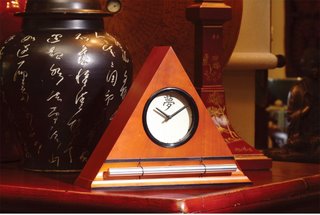 sleep better naturally, wake up with a calming zen alarm clock Now & Zen
1638 Pearl St.
Boulder, CO 80302
(800) 779-6383
Posted in Insomnia, Natural Awakening
 Choose The Zen Alarm Clock - for a Gentle, Progressive Awakening Sleep deprivation is a little known, but serious national problem.
So believes Dr. William Dement, M.D., Ph.D., considered the world’s leading authority on sleep, sleep deprivation and the diagnosis and treatment of sleep disorders.
A groundbreaking pioneer in the early days of sleep research, Dement is an outspoken advocate for sleep awareness as a cure for what he calls a “sleep-sick society.” He recently authored a book, “The Promise of Sleep”, a comprehensive overview of what happens when we sleep, its effect on overall health, and the dangers of sleep loss and deprivation.
Still active in the field at age 71, Dement draws upon four decades of experience as a dedicated scientist, sleep doctor, and clinic and laboratory administrator. He is the founder and director of the Stanford Sleep Disorders Center, the world’s first sleep disorders center, where people continue to seek treatment, and research is ongoing.
His book is a definitive guide to sleep and what he calls its “vital connection between health and happiness.” Co-written with Christopher Vaughan, the 540-page book covers everything from the definition of sleep and history of sleep and sleep disorder research, to chronic disorders and treatments.
Dement explores the connection between sleep and physical and mental well-being, presents insightful background on dreams – one of his early interests, and offers a step-by-step guide to help people take personal stock of their sleep needs at any age. Readers will also find useful information about the variety of disorders that exist and their definitions, and a listing of sleep center locations by state and sleep-related Web sites.
“Sleep deprivation is an across-the-board problem. But society is completely ignorant about sleep. It’s time people wake up and move sleep education into the mainstream,” said Dement, whose expertise is frequently sought.
Some of the world’s biggest catastrophes can be linked, in part, to sleep deprivation, incidents such as the Three-Mile Island nuclear event, Exxon Valdez oil spill, and even the Challenger shuttle explosion. “These events happened because someone fell asleep,” said Dement.
“In a recent survey by the National Sleep Foundation, 23 percent of people polled admitted to falling asleep while driving,” Dement writes in his book. “With this mind, it should come as no surprise that sleep deprivation plays a major role in most accidents labeled “cause unknown,’ or that an estimated 24,000 people die each year in accidents caused directly or in part by falling asleep at the wheel. Almost all of us, regardless of our formal education, are dangerously misinformed about drowsy driving and its causes.”
Dement serves as chairman of the National Commission on Sleep Disorders Research, whose report led to creation of the National Center on Sleep Disorders Research – a new agency within the National Institutes of Health.
 Choose A Soothing Alarm Clock - Sleep deprivation is a little known, but serious national problem. In 1992, the commission’s report to Congress, “Wake Up America: A National Sleep Alert” urged more federal funding for sleep research, and a campaign of public awareness about the nature and impact of sleep disorders, calling sleep deprivation “a national emergency.”
Dement in 1975 launched the American Sleep Disorders Association and served as president for a dozen years. He teaches a popular “Sleep and Dreams” course at Stanford and wrote the first undergraduate textbook in the field.
“People don’t realize that sleep loss piles up like a debt. People think that sleep debt goes away, but it only gets bigger,” said Dement, who continues to address the problem before civic and business groups, governmental bodies and health professionals across the country.
“I’m sounding the alarm in every way I can.”
Waking up in the morning should be as pleasant as falling asleep at night. The Zen Alarm Clock’s gradual, gentle awakening is transformative.
Boulder, Colorado—an innovative company has taken one of life’s most unpleasant experiences (being startled awake by your alarm clock early Monday morning), and transformed it into something to actually look forward to. “The Zen Alarm Clock,” uses soothing acoustic chimes that awaken users gently and gradually, making waking up a real pleasure.
Rather than an artificial recorded sound played through a speaker, the Zen Clock features an alloy chime bar similar to a wind chime. When the clock’s alarm is triggered, its chime produces a long-resonating, beautiful acoustic tone reminiscent of a temple gong. Then, as the ring tone gradually fades away, the clock remains silent until it automatically strikes again three minutes later. The frequency of the chime strikes gradually increase over ten-minutes, eventually striking every five seconds, so they are guaranteed to wake up even the heaviest sleeper. This gentle, ten-minute “progressive awakening” leaves users feeling less groggy, and even helps with dream recall.
adapted from sfgate.com by Elaine Larson
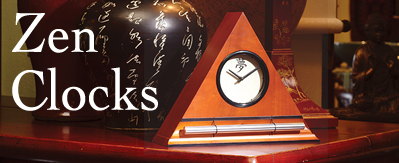 The Zen Alarm Clock Shop - Boulder, CO Now & Zen – The Zen Alarm Clock Shop
 The Zen Alarm Clock Showroom - Boulder, CO - orders@now-zen.com 1638 Pearl Street
Boulder, CO 80302
(800) 779-6383
orders@now-zen.com
Posted in Bamboo Chime Clocks, sleep, Sleep Habits
 Choose a gentle, chime alarm clock - an alternative, soothing alarm clock When Margaret Chau has a bad night’s sleep, she knows to steer clear of loved ones the next day – she’s cranky and impatient, and she tends to take it out on others.
“I don’t want to deal with things because I’m afraid of not being able to do it rationally or logically,” said the Millbrae woman, who suffers from chronic insomnia due to back pain. “I know myself, and I don’t want to react badly or do something I might regret.”
It’s no secret that the sleep-deprived are usually grumpy, miserable and not much fun to be around, but new research from UC Berkeley using brain-scanning equipment helps explain why. The study, which was published Monday in the journal Current Biology, was the first to use MRI technology to show exactly what areas of the brain are affected by sleep deprivation.
Results show a connection between negative thinking and lack of sleep, and while there is still years, if not decades, of research to be done on the subject, the study’s authors say it could point to a connection between sleep deprivation and psychiatric disorders like depression and post-traumatic stress syndrome.
It could even help explain road rage, said Matthew Walker, director of UC Berkeley’s Sleep and Neuroimaging Laboratory and senior author of the study, which was coordinated with researchers from Harvard University.
“One of the functions of sleep is to reset and replenish the emotional integrity of our brain circuits so we can approach the day’s emotional challenges in appropriate ways,” Walker said. “If you don’t get a good night’s sleep, you’ll be making irrational choices.”
 Choose a peaceful chime alarm clock Americans are among the most sleep-deprived people in the world, doctors and sociologists say. About 40 percent of Americans get less than seven hours of sleep a night, according to a 2005 poll conducted by the National Sleep Foundation, and 75 percent reported having some sort of sleep disorder one or two nights a week.
National guidelines recommend people get between seven or eight hours of sleep a night.
Polls also show that Americans are getting less sleep all the time, as people deal with daily distractions, from work and family life to just staying up late watching TV or surfing the Internet. The National Sleep Foundation poll found that only 26 percent of adult Americans were getting at least eight hours of sleep a night in 2005, compared to 35 percent in 1998.
But lack of sleep isn’t just confined to adults.
Dr. Rafael Pelayo, director of Pediatric Sleep Service at Lucile Packard Children’s Hospital, said he’s noticed sleep deprivation is a growing problem among teenagers.
“They seem to be modeling their parents and getting as little sleep as possible. They’re routinely staying awake past their parents and they’re drinking more coffee,” Pelayo said. “Sleep is still an afterthought for most people; it’s something they can sacrifice. But sleep is actually an important cornerstone of health.”
Lack of sleep can lead to a loss of concentration and memory, can make people more sluggish and reduce motor skills, and can even weaken the immune system. But it also increases activity in the parts of the brain related to a variety of psychiatric disorders, according to the new research.
In the UC Berkeley study of 26 young adults, half of the subjects were kept awake for 35 hours straight and the other half were allowed a normal night’s sleep in that same time period. Then all of the subjects were hooked up to an MRI and shown a series of images, some of them disturbing pictures of graphic violence or gory injuries. Researchers monitored what happened in their brains as each image was shown.
When shown the disturbing images, the sleep-deprived subjects had a significant jump in activity in the amygdala, the section of the brain that puts the body on alert to protect itself. At the same time, activity slowed down in the prefrontal cortex, which controls logical reasoning.
Subjects who had gotten a full night of sleep showed normal brain activity.
What this means for most people is that a sleepless night can cause them to overreact to emotional challenges that they would otherwise be able to tolerate with no trouble, Walker said.
That’s why new parents might be more prone to snap at each other over petty arguments, or morning commuters might be more likely to lay on the horn when someone cuts them off instead of just let it go, Walker said. It also might make horror movies scarier, as the brain doesn’t do quite as good a job at separating fact from fiction.
“We become emotionally dis-regulated,” Walker said. “Ordinarily, if you saw a gun pointed at your face, you wouldn’t overreact because your brain puts it in context and tells you that you’re sitting in a movie theater staring at a screen. But that function seems to be disconnected when you’re sleep-deprived.”
Much more research needs to be done, Walker said, but sleep experts are already hopeful that more study could lead to refined options for treating not just sleep disorders, but psychiatric problems such as depression and anxiety.
Dr. Anil Rama, medical director of the Regional Sleep Medicine Laboratory at Kaiser Permanente in San Jose, said he’s intrigued by Walker’s research, but notes that the brain responses to sleep deprivation are likely so complicated that not much will change in terms of treatment any time soon.
Eventually, “if we start looking at the pathways that are involved with sleep deprivation, perhaps we can intervene there,” he said. “But I’m skeptical that isolating one particular pathway is very important. It has to be in the context of a whole body of literature, and there are so many things our emotional centers are tied into.”
adapted fro SFgate.com by Eric Allday
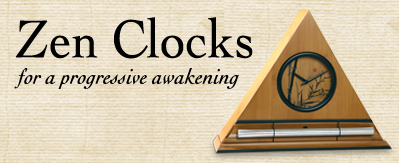 Peaceful Chime Alarm Clock - The Zen Clock Store - Boulder, CO Now & Zen – The Zen Alarm Clock Shop
 The Peaceful Alarm Clock Store - Boulder, CO 1638 Pearl Street
Boulder, CO 80302
(800) 779-6383
orders@now-zen.com
Posted in Bamboo Chime Clocks, sleep, Sleep Habits
 Use Your Gong Meditation Timer for Your Stillness Practice New research suggests that qualities the world desperately needs more of — love, kindness and compassion — are indeed teachable.
Imaging technology shows that people who practice meditation that focuses on kindness and compassion actually undergo changes in areas of the brain that make them more in tune to what others are feeling.
“Potentially one can train oneself to behave in a way which is more benevolent and altruistic,” said study co-author Antoine Lutz, an associate scientist at the University of Wisconsin-Madison.
How far this idea can be extrapolated remains in question, though.
“I think there’s no question that people can benefit from these practices,” said Dr. Louis Teichholz, medical director of complementary medicine and chief of cardiology at Hackensack University Medical Center in New Jersey. “I think the question is how easy is it to get trained enough so that it will make a clinical difference, and I don’t think this study answers that.”
The findings were published in the March 26 issue of the Public Library of Science One.
Recent brain-imaging studies have suggested that the insula and the anterior cingulate cortices regions are involved in the empathic response to other people’s pain. But not much is known about how cultivating compassion might affect brain circuitry.
And previous research has indicated that meditation may reduce the brain’s reaction to pain, and that it may actually improve cardiovascular health by decreasing the risk of metabolic syndrome.
“The main research question was to see whether some positive qualities such as loving-kindness and compassion or, in general, pro-social altruistic behavior, can be understood as skills and can be trained,” Lutz explained.
In the same way that training in sports or chess or music produces functional and structural changes in the brain, the Wisconsin researchers wanted to see if cultivating compassion through the practice of meditation also produced brain changes — suggesting that compassion could be viewed as a learned skill.
 Meditation can increase compassion - choose a soothing meditation timer The study involved 32 people: 16 Tibetan monks and lay practitioners, who had meditated for a minimum of 10,000 hours throughout their lifetime (the “experts”); and 16 control subjects, who had only recently been taught the basics of compassion meditation (the “novices”).
The senior author of the paper, Richard Davidson, a professor of psychiatry and psychology at the University of Wisconsin-Madison and an expert on imaging the effects of meditation, has been collaborating with the Dalai Lama since 1992, studying the brains of Tibetan monks.
For the study, individuals in the control group were instructed first to wish loved ones well-being and freedom from pain, then to wish such benefits to humankind as a whole.
“We looked at whether there were any differences between experts and novices in generating compassion with the idea that a central practice in this tradition [of meditation] is to cultivate these positive emotions,” Lutz said. “We wanted to see if there were any differences in the way the brain was reacting.”
Each participant was hooked up to a functional MRI both while meditating and not meditating. During each state, the participants heard sounds designed to produce responses: the negative sound of a distressed woman, the positive sound of a baby laughing, and the neutral sound of background noise from a restaurant.
“We showed altered activation in brain circuitry that was previously linked to empathy and perspective-taking or the capacity to understand other’s intentions and mental states and, more precisely, the insula was more activated, particularly in response to negative emotional sounds,” Lutz said.
In the monks, especially, these areas of the brain were activated even more when they hard the cries of the distressed woman, she said.
The study authors hope the findings might one day help with a range of problems, including reducing the incidence of bullying in schools or helping people with depression.
“The next step is to see if this works,” Lutz said. “If it works, then it can be applied to selective populations — for instance, depressed people or, more broadly, in education.”
 Can you cultivate compassion? More information
The U.S. National Center for Complementary and Alternative Medicine has more about meditation and health.
SOURCES: Antoine Lutz, Ph.D., associate scientist, Waisman Center, University of Wisconsin-Madison; Louis E. Teichholz, M.D., medical director, complementary medicine, and chief, cardiology, Hackensack University Medical Center, New Jersey; March 26, 2008,Public Library of Science One
Use our unique “Zen Clock” which functions as a Yoga & Meditation Timer. It features a long-resonating acoustic chime that brings your meditation or yoga session to a gradual close, preserving the environment of stillness while also acting as an effective time signal. Our Yoga Timer & Clock can be programmed to chime at the end of the meditation or yoga session or periodically throughout the session as a kind of sonic yantra. The beauty and functionality of the Zen Clock/Timer makes it a meditation tool that can actually help you “make time” for meditation in your life. Bring yourself back to balance.
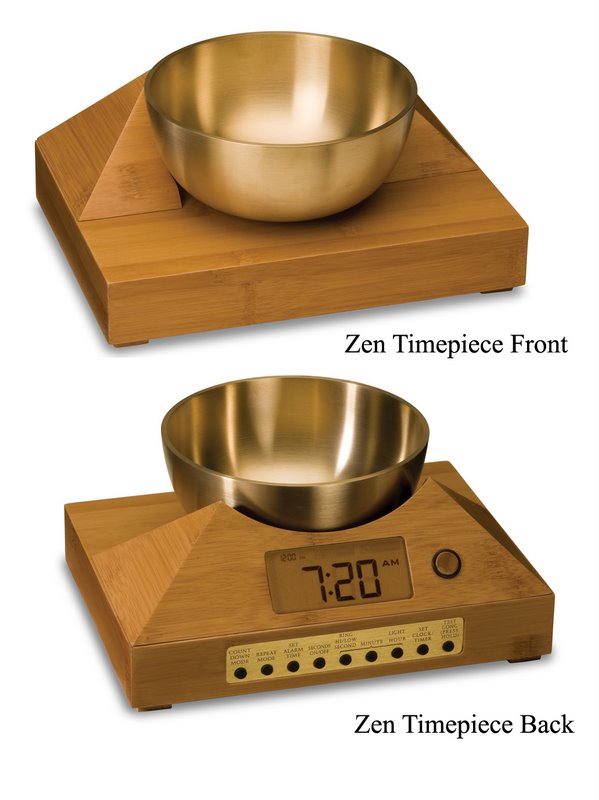 Gong Meditation Timer in Bamboo Now & Zen – The Meditation Timer Shop
1638 Pearl Street
Boulder, CO 80302
(800) 779-6383
Posted in Bamboo Chime Clocks
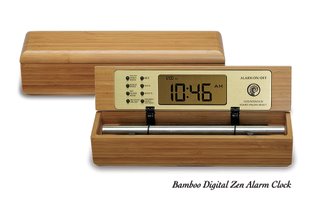 soothing chime meditation timers The Digital Zen Clock also serves as a countdown and interval timer for yoga, meditation, bodywork, etc.; and it can also be set to chime on the hour as a tool for “mindfulness.”
 soothing meditation timers and mindfulness practice tools Now & Zen Headquarter Store
1638 Pearl Street
Boulder, CO 80302
(800) 779-6383
Posted in Bamboo Chime Clocks
 Do you want an alarm clock with real, acoustic sounds - choose The Zen Clock from Now & Zen Are you and your partner at odds over your sleeping arrangements? Does one person snore in bed and the other hog the covers? Do you hate your spouses radio alarm clock?
If sleeping next to your partner is a struggle, you’re not alone. One in fourAmerican couples sleep separately, according to a study by the National Sleep Foundation. Often the problem is not intimacy, but the seemingly simple act of sharing a bed with a spouse.
The Wall Street Journal reports that while many couples have learned to compromise in other areas of their lives, they can’t find common ground on sleeping together.
Couples often have different sleeping habits and preferences — like room temperature, watching TV in the bedroom or when to turn the lights off — and experts say it takes communication and compromise to share the sack.
Buy The Zen Alarm Clock – it will transform your husbands mornings, and awakening you gradually with a series of gentle acoustic chimes Once you use a Zen Clock nothing else will do.
Boulder, Colorado—an innovative company has taken one of life’s most unpleasant experiences (being startled awake by your alarm clock early Monday morning), and transformed it into something to actually look forward to. “The Zen Alarm Clock,” uses soothing acoustic chimes that awaken users gently and gradually, making waking up a real pleasure.
Rather than an artificial recorded sound played through a speaker, the Zen Clock features an alloy chime bar similar to a wind chime. When the clock’s alarm is triggered, its chime produces a long-resonating, beautiful acoustic tone reminiscent of a temple gong. Then, as the ring tone gradually fades away, the clock remains silent until it automatically strikes again three minutes later. The frequency of the chime strikes gradually increase over ten-minutes, eventually striking every five seconds, so they are guaranteed to wake up even the heaviest sleeper. This gentle, ten-minute “progressive awakening” leaves users feeling less groggy, and even helps with dream recall.
 Alarm Clocks with Real Sounds - No Electronic Sounds - Boulder, CO Now & Zen – The Zen Alarm Clock Store
Alarm Clocks with Chimes – no Electronic Sounds
1638 Pearl Street
Boulder, CO 80302
(800) 779-6383
orders@now-zen.com
Posted in Bamboo Chime Clocks, sleep, Sleep Habits, Well-being, Zen Alarm Clock
 Sounder Slumber with Natural Chime Alarm Clocks There’s a growing body of evidence linking sleep deprivation to poor physical health. Now there’s a study that suggests sleeplessness can hurt your fiscal fitness too.
Researchers at Duke University have found out that sleep deprivation boosts the part of your brain that tends toward optimism,; it also leads the part of your brain that processes negative outcomes to pipe down. As the news releases noted:
Sleep-deprived individuals in the study tended to make choices that emphasized monetary gain, and were less likely to make choices that reduced loss.
Although the study examined the way people in casinos behaved, it’s worth pondering how sleeplessness could be affecting your everyday financial decisions.
It’s one thing to be a sleep-deprived new parent and pony up for the Cloud b Sleep Sheepbecause you are desperate for the baby to sleep anywhere other than your arms ( … um. Not that I speak from personal experience. Or am bitter it didn’t work).
But is it possible that the chronically sleep deprived might be more prone to false thrift because they’re focusing more on the perceived financial benefits than on the realistic and likely drawbacks? Or perhaps their fiscal discipline is napping while they’re still up. In the bookNurtureShock: New Thinking About Children, authors Po Bronson and Ashley Merryman write:
Sleep loss debilitates the body’s ability to extract glucose from the bloodstream. Without this stream of basic energy, one part of the brain suffers more than the rest — the prefrontal cortex, which is responsible for what’s called “Executive function.” Among those executive functions are the orchestration of thoughts to fulfill a goal, prediction of outcomes, and perceiving consequences of actions.
Working toward goals, thinking through consequences — those sound like two of the governing mechanisms that help people manage their spending and saving.
Perhaps somewhere Benjamin Franklin is smiling. After all he is the one who said, “Early to bed and early to rise, makes a man healthy, wealthy and wise.”
 One of the ultimate Zen like experiences is waking-up from a great slumber refreshed and energized. The right alarm clock can be the most beneficial investment for you. With our Now & Zen natural alarm clock you are awakened more gradually and thus more naturally. Now & Zen is focused on creating a naturalistic lifestyle, and our clocks are an example of our philosophy.
One of the ultimate Zen like experiences is waking-up from a great slumber refreshed and energized. Your mind and body are harmoniously one, both alert and focused. Having a refreshed mind and body are two keys to a natural and Zen lifestyle. Waking up in the morning should not be a loud and abrupt awakening, but rather it should be a peaceful positive experience. The right natural alarm clock can transition your deep and tranquil sleep into a serene start to consciousness. Imagine a long-resonating Tibetan bell-like chime waking you up to a beautiful morning experience.
adapted from sfgate.com by Lisa Schmeiser
Now & Zen – The Chime Alarm Clock Store – Downtown Boulder
1638 Pearl Street
Boulder, CO 80302
(800) 779-6383
Orders@now-zen.com
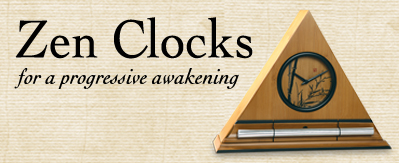 The luxurious awakening provided by the Zen Alarm Clock is part of the growing preference for things natural—natural foods, natural fibers, and now, natural acoustic sounds.
Posted in Bamboo Chime Clocks, Chime Alarm Clocks, Natural Awakening, sleep, Sleep Habits
 Meditation as a Transformation Tool - Ukiyo-e Many moons ago, a wandering Nepalese prince sat under a tree, vowing not to rise until he attained enlightenment.
After a long night of deep meditation, Siddhartha Gautama, better known as the Buddha, saw the light and declared that suffering is subjective, and can be reduced through self-awareness.
Today, 2500 years later, a growing number of American doctors and healthcare workers are teaching people who are ill how to apply Buddha’s epiphany to their lives.
adapted from abcnews.com by By Ephrat Livni
In hospitals, businesses and community centers around the country, meditation is increasingly being offered as a method of stress reduction, and to help patients better cope with the physical pain and mental strain associated with many medical conditions, including heart disease and HIV infection.
Recent research shows meditation’s soothing effects can be detected in arterial walls and in the brain. Once considered outside the mainstream, today more insurers are paying for meditation, both as a form of medication and as preventive medicine.
Learning to ‘Disidentify’
“Meditation is the act of disidentifying from inner thought flow and concentrating on calming and healing,” explains Robert Thurman, Ph.D., a professor of Indo-Tibetan Buddhist Studies at Columbia University in New York and the first American to become a Tibetan Buddhist monk. Through meditation, doctors help patients detach from their pain and anxieties and cultivate a connection between the mind and the body, he says.
 Gong Clock - Progressive, Soothing Tones to End Your Stillness Practice While there are many kinds of meditation, the mindfulness approach, used widely in hospitals around the country, focuses primarily on breathing. Practices vary, but the basic idea involves sitting comfortably, with eyes closed, spine straight and attention focused on breathing.
Practitioners aim to maintain a detached, calm awareness of their thoughts and sensations. Through mindfulness, experts say, meditators learn to pay attention to the present and cultivate clarity of mind, equanimity and wisdom.
Minor Mindfulness Miracles
All of which may sound very abstract. Unless, points out Jeff Brantley, Ph.D, Director of the Mindfulness-based Stress Reduction (MBSR) Program at the Duke Center for Integrative Medicine in Durham, N.C., you are a patient who is suffering.
“We had one patient, a 40-year-old woman with metastatic breast cancer who was enrolled in the 8-week MBSR program. At her exit interview she said that before the course began 5 minutes wouldn’t go by without her worrying about what would become of her and her young family and now, after the class, she can concentrate on other things for more than hour at a time, even days,” Brantley says, calling the results “a minor miracle.”
The Duke program is one of at least 70 such mind-body based courses modeled on the University of Massachusetts Medical School’s Stress Reduction Clinic, in Worcester, Mass., created in 1979 by Dr. Jon Kabat-Zinn. Taught mainly in hospitals around the country, mindfulness training is typically run as an 8-week-long outpatient program to complement other medical treatments.
The aim, according to a website dedicated to Mindfulness-based Stress Reduction, is to assist people in taking better care of themselves “through a gentle but rigorous daily discipline of meditation and relaxation.”
Doctors refer patients to mindfulness programs for any number of diseases and disorders, including heart disease, anxiety and panic, job or family stress, chronic pain, cancer, HIV infection, AIDS, headaches, sleep disturbances, type A behavior, high blood pressure, fatigue and skin disorders.
In keeping with the growing interest in preventative medicine, some insurance companies, such as Blue Cross/Blue Shield in Massachusetts and a number of insurers in what Thurman calls “the more enlightened states like Oregon and California,” are now paying for all or part of these programs.
Research for Coverage
 Meditation for Well-being, Choose a Soothing, Chime Timer While the National Institutes of Health says it is too soon to quantify the medical benefits of meditation, Anita Greene, spokeswoman for the Institute’s Complementary and Alternative Medicine division, concedes, “It is a therapy worthy of further scientific investigation to refute or support the health claims being made.”
In fact, in 1999, the NIH granted Maharishi University of Management in Fairfield, Iowa, $8 million during a five-year period to study the effects of meditation in African Americans with cardiovascular diseases.
Researchers at Maharishi say that relaxing and reducing stress through transcendental meditation may reduce artery blockage and the risk of heart attack and stroke, according to a study released in the March issue of the American Heart Association’s journal Stroke (see related story).
Another recent pilot study, published in the May 15 issue of NeuroReport, by Sara Lazar, Ph.D., a Harvard research fellow in psychology at Massachusetts General Hospital, in Boston, suggests meditation activates specific regions of the brain that may influence heart and breathing rates. Using a brain imaging technique known as functional magnetic resonance imaging, or fMRI, Lazar measured blood flow changes in experienced meditators.
“What we found were striking changes. There was significant decrease in blood flow and activity in specific areas of the brain,” says the study’s senior author Dr. Herbert Benson, president of the Mind/Body Medical Institute at Beth Israel Deaconess Medical Center in Boston, Mass.
The usual, fight-or-flight brain response liberates adrenalin and is stressful to the body, he explains, but during meditation the brain acts to quiet the body through concentrated breathing or word repetition, evoking a relaxation response that minimizes the harmful effects of stress.
“It does away with the whole separation of mind and body and gives further proof to insurers that [meditation] is cost effective,” he says. Ultimately, Benson predicts, medicine will be akin to a three-legged stool, leaning on pharmaceuticals, surgeries and procedures, and self-care, which includes, meditation, nutrition, exercise and health management.
A Tool for Transformation
But, Thurman points out, meditation is for more than just health benefits: It is a tool for seeking inner transformation. Meditation practices in the health field are secular, however.
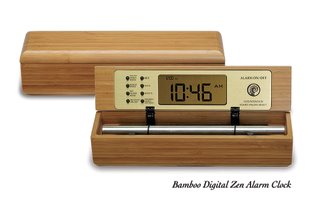 Gong Clock for Meditation and Yoga Practices “We get everyone from born-again Christians to avowed atheists. We tell people we are not trying to make anyone into anything,” Duke’s Brantley reassures. No matter what their religious persuasion, he says, patients find an increased awareness and appreciation of their lives.
Registered nurse Shirley Gilloti, a San Rafael, Calif., health educator and mindfulness training teacher agrees, “I tell people to try to bring more mindfulness to saying their rosary if that’s what they do.”
Use our unique “Zen Clock” which functions as a Yoga & Meditation Timer. It features a long-resonating acoustic chime that brings your meditation or yoga session to a gradual close, preserving the environment of stillness while also acting as an effective time signal. Our Yoga Timer & Clock can be programmed to chime at the end of the meditation or yoga session or periodically throughout the session as a kind of sonic yantra. The beauty and functionality of the Zen Clock/Timer makes it a meditation tool that can actually help you “make time” for meditation in your life. Bring yourself back to balance.
 Gong Clock & Timers by Now & Zen, Inc. - Boulder, CO Now & Zen – The Gong Clock Shop
Downtown Boulder, CO
1638 Pearl Street
Boulder, CO 80302
(800) 779-6383
Orders@Now-Zen.com
Posted in Bamboo Chime Clocks, Yoga Timer, Yoga Timers by Now & Zen, Zen Alarm Clock, Zen Timepiece by Now & Zen
|
|
|
|